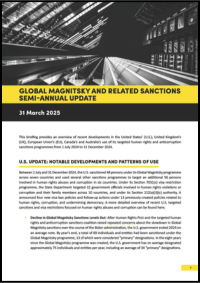Publications
REDRESS’ publications are also available in hard copy format. Please contact us for further information on [email protected].
This briefing paper was prepared for parliamentarians on the Crime and Policing Bill. It recommends that MPs should seek to amend the Crime and Policing Bill to include provisions allowing instrumentalities, proceeds or property confiscated under POCA to be used for “public interests or social purposes”, where appropriate.
This briefing provides an overview of recent developments in the United States’ (U.S.), United Kingdom’s (UK), European Union’s (EU), Canada’s and Australia’s use of its targeted human rights and anti-corruption sanctions programmes from 1 July 2024 to 31 December 2024.
Over two years, REDRESS, with support from the Global Survivors’ Fund, worked with partners in Chad, DRC, Kenya, and Nepal to promote the implementation of reparation decisions for survivors of Conflict-Related Sexual Violence (CRSV). Using survivor-centred, holistic strategic litigation and advocacy, the project aimed to build coalitions, support survivors, and foster knowledge exchange among practitioners. This brief shares key insights from the initiative and complements a fuller report that examines obstacles to implementation and highlights adaptable tools and techniques from 11 cases.
A letter to the Minister of State on behalf of Human Rights First President and CEO Susan Hendrickson and REDRESS Director Rupert Skilbeck recommending that the United Kingdom build on existing leadership in the use of targeted human rights and anticorruption sanctions, in light of growing concerns that the new US administration is deprioritising efforts to defend human rights and fight corruption.
This Practice Note aims to provide practical guidance on how to construct a reparation complaint for submission to international and regional human rights mechanisms, along with strategies for implementing their reparation decisions. It includes commentary on each mechanism, outlines legal procedures, and includes examples of measures of reparation awarded.

The European Union’s (EU) strategy on victims’ rights (2020-2025), adopted by the European Commission, seeks to improve access to justice for all victims of crime. Following the adoption of the strategy, the Commission was tasked with assessing whether a revision of the EU Directive 2012/29/EU was necessary. This initiated the current process of the Directive’s revision, with several Amendment Proposals being published. REDRESS has made recommendations to the proposed amendments, in particular recommending that the Directive adopts the language of “core international crimes, including torture and enforced disappearance”: This additional brief provides further clarification with regard to the definition of “core international crimes” versus “crimes falling within the jurisdiction of the International Criminal Court.” It aims to promote language that is inclusive of all victims of core international crimes, which is more in line with EU Member States’ obligations under international treaties and international customary law to investigate and prosecute torture and enforced disappearance.
This briefing by the International Accountability Platform for Belarus (IAPB) explains what the Lithuania's referral of the situation in Belarus to the International Criminal Court (ICC) is about, and describes the procedure and ensuing examination by the Office of the Prosecutor of the ICC. It also sets out what States can do to support the opening of an investigation.
The European Union has long prioritised accountability and the fight against impunity for serious international crimes within its justice and human rights agenda, with several Member States establishing specialised units to investigate and prosecute war crimes, crimes against humanity, genocide, and related atrocities. Central to these efforts is the principle of universal jurisdiction, which allows States to prosecute individuals for such crimes regardless of where they occurred or the nationality of those involved. This briefing paper, by REDRESS and the Global Initiative against Impunity and funded by the European Union, outlines how the European Union can use universal jurisdiction to end impunity for international crimes.








